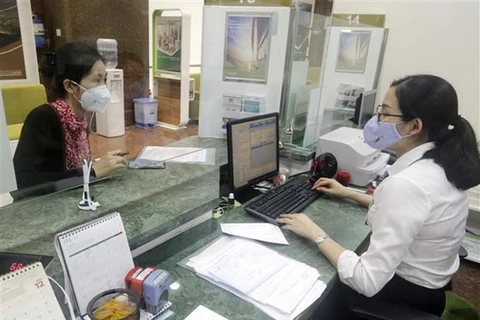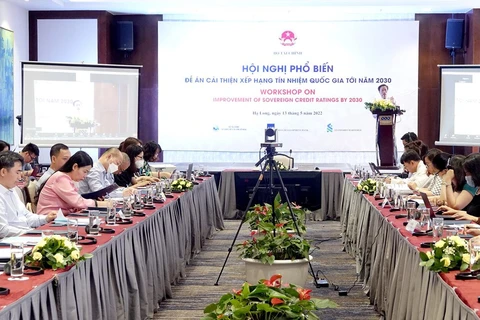 Moody's Investors Service upgrades Vietnam's long-term issuer and senior unsecured ratings to Ba2 from Ba3 and changes its outlook from positive to stable. Illustrative image. (Photo: VNA)
Moody's Investors Service upgrades Vietnam's long-term issuer and senior unsecured ratings to Ba2 from Ba3 and changes its outlook from positive to stable. Illustrative image. (Photo: VNA)Hanoi (VNA) – Moody's Investors Service has upgraded Vietnam's long-term issuer and senior unsecured ratings to Ba2 from Ba3 and changed its outlook from positive to stable, the Ministry of Finance announced on September 6.
In its newly released report, Moody's said: "The upgrade to Ba2 reflects Vietnam's growing economic strengths relative to peers and greater resilience to external macroeconomic shocks that are indicative of improved policy effectiveness, and which Moody's expects to continue as the economy benefits from supply chain reconfiguration, export diversification and continued inbound investment in manufacturing.”
"The rating also reflects a sounder fiscal footing backed by contained borrowing costs, a conservative approach to fiscal policy and improved government liquidity, driven by the ongoing transition from external concessional borrowing toward longer-dated, low-cost domestic market financing."
The stable outlook reflects a balance of risks to the rating. On the positive front, Moody's expects continued improvements in economic competitiveness to support rising incomes and advancements in fiscal prudence demonstrated through the execution of a more systematic, long-term debt management strategy and an increasing emphasis in fiscal policy on long-term challenges, including improving worker productivity and mitigating against physical climate risks. However, on the downside, the relatively low capitalisation levels of State-owned banks coupled with high domestic credit growth and potential real estate sector risks to the real economy in the event of a shock. In addition, uncertainties relating to regional and global geopolitical tensions, higher imported input prices and uncertain growth prospects in Vietnam's key trading partners may also limit external surpluses for Vietnam's trade-reliant economy.
According to Moody's, increasing competitiveness and integration with global value chains support Vietnam's rising economic strength.
The increasing demand for Vietnamese exports through the coronavirus pandemic underpins the growing competitiveness of Vietnam's manufacturing sector, which has outperformed regional peers in the attraction of foreign direct investment (FDI) and has driven a rapid rise in per capita income.
 Vietnam's centrality to multiple regional and bilateral trade agreements is expected to affirm its entrenched position in global value chains. Illustrative image (Photo: VNA)
Vietnam's centrality to multiple regional and bilateral trade agreements is expected to affirm its entrenched position in global value chains. Illustrative image (Photo: VNA) Moody's expects Vietnam's centrality to multiple regional and bilateral trade agreements to affirm its entrenched position in global value chains. For example, Vietnam is a party to the Regional Comprehensive Economic Partnership (RCEP) and the Comprehensive and Progressive Agreement for Trans-Pacific Partnership (CPTPP) and bilateral Free Trade Agreements (FTAs) with the Republic of Korea, and, more recently, with the EU and the UK. These trade agreements will strengthen Vietnam's competitive position in lower-value products such as footwear, garments and agricultural goods while placing it firmly in higher-value-added regional tech supply chains for smartphones, computers and other electronic products.
In the report, Moody's said Vietnam's fiscal capacity would improve, supported by prudent debt management policies and increased focus on long-term risks.
"Fiscal policy effectiveness has improved, including a greater emphasis on medium-term budget planning and the deepening of domestic, low-cost financing sources. The National Assembly has also lowered the statutory public debt ceiling to 60% of GDP from 65% to anchor debt levels better while preserving fiscal flexibility amid the ongoing economic recovery," Moody's said.
However, transparency regarding contingent liabilities remains limited, including the size and financial performance of large state-owned enterprises, and delays in the execution of the government's large public investment budget are credit constraints.
Moody's expects Vietnam's fiscal deficit to be marginally higher at around 3.8% in 2022, in line with the Ba-rated median, as the authorities implement the 350 trillion VND (14.65 billion USD) socio-economic recovery and development programme.
The country's fiscal deficit is forecast to consolidate to around 2.7% by 2025, with the government debt burden set to decline to approximately 37%.
Against the backdrop of global uncertainties, Vietnam is the only nation in Asia-Pacific and one of the four countries globally to have ratings upgraded by Moody's since the beginning of this year./.






















